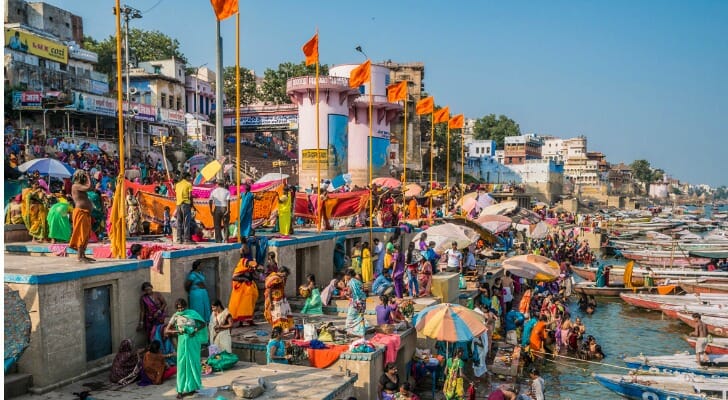How to Retire in India: Costs, Visas and More
India is known for its vibrant culture, with food, architecture and colorful festivals contributing to a cultural smorgasbord with a millenia-old history. Whether you’re a city dweller, a mountain climber, or a beach bum,...Friday, March 20th 2020, 9:05 am
By Ashley Chorpenning
 India is known for its vibrant culture, with food, architecture and colorful festivals contributing to a cultural smorgasbord with a millenia-old history. Whether you’re a city dweller, a mountain climber, or a beach bum, India has something for you. All these options, paired with a low cost of living in comparison to the United States, make India a potentially appealing option for those seeing to retire overseas. Here’s what you need to know before you retire in India.
India is known for its vibrant culture, with food, architecture and colorful festivals contributing to a cultural smorgasbord with a millenia-old history. Whether you’re a city dweller, a mountain climber, or a beach bum, India has something for you. All these options, paired with a low cost of living in comparison to the United States, make India a potentially appealing option for those seeing to retire overseas. Here’s what you need to know before you retire in India.
Getting an Indian Visa
India offers a vast array of visas, many of them tailored to people with a specific vocation or people from a specific country. There is no retirement visa as such. However, there are several visas that will allow you to stay in India for extended periods. One option is to get a standard tourist visa. This allows you to stay in the country for 180 days at a time. To renew the visa, you’ll have to return home and not re-enter India for two months. You may repeat this process as much as you’d like for up to six years. After that period, you’ll have to reapply for the tourist visa.
Another option is a business visa that lets a person stay in the country for a year or for the length of an employment contract.
There is also a visa for people of Indian origin. People of Indian origin are individuals who have held Indian nationality in the past, are the spouse of someone with Indian origin, or a spouse or dependent of someone who has a long-term Indian visa. These individuals can stay in India for up to five years.
Housing and Other Costs of Living in IndiaForeign nationals can’t legally buy property in India unless they have earned legal residence in the country for 180 days per year. It’s also illegal to buy property on a tourist visa or to purchase property jointly with an Indian national, person of Indian origin, or a non-resident Indian.
Foreigners may rent homes in India. The cost of rent in India is 86.49% lower than the cost of living in the U.S., according to Numbeo, a cost-of-living calculator. The national average for a one-bedroom apartment in the average city center of India is about $167.17 per month. This is compared to the national average of a one-bedroom apartment in the U.S., which is about $1,360.70 per month. For those who want more space, the national average of a three-bedroom apartment in the city center is $369.90 per month. That contrasts with the national average in the U.S. of $2,209.10 per month.
To be more specific, the rent in Goa, a hotspot for retirees, is about $355.49 per month for a three-bedroom apartment. In New York, a similar apartment would cost $6,601 per month.
Taxes in IndiaAs someone on a tourist visa, you will not be required to pay taxes in India. You will also not be allowed to work. If you are on a resident visa, you will be required to pay taxes on income earned in India. If you earn less than 500,000 rupees, or about $6,700, you will not be taxed on your income. After that, the tax rate is 20% on the income you earn over $6,700.
As a U.S. citizen, you must file a tax return in the U.S. each year. If you earn any money outside of the U.S., you can use a few different provisions to reduce your U.S. taxable income. These include the foreign earned income exclusion, the foreign tax credit and the foreign housing exclusion, among others. If you’d like to forecast your tax burden more specifically, you may want to consult with a tax expert who is familiar with both the U.S. and your country of residence’s tax laws.
Healthcare in IndiaIndia operates a free healthcare system, but it’s underfunded by global standards and ranks in the lower half of the World Health Organization list of national healthcare systems. Therefore, highly trained healthcare workers tend to leave the country to work elsewhere and the hospitals are largely understaffed. India has a private-sector health system that is much closer to western standards. Most families pay out-of-pocket for private healthcare and several opt for health insurance.
Private healthcare and health insurance are recommended for visitors to India. Most major cities have western-style public hospitals that treat both emergencies and non-emergencies. Not all healthcare insurance providers are recognized by Indian hospitals, and visitors sometimes must pay out of pocket for their treatment.
Safety in India India sometimes has threats of domestic terrorism, which are typically carried out against locals or local governments by specific groups. However, sometimes areas frequented by westerners are targeted. These areas may include train stations, restaurants, and markets. Religious tensions between Hindus and Muslims sometimes erupt in violence, and some Hindu groups have attacked members of indigenous Christian communities. Check the U.S. State Department’s website for current alerts.
India sometimes has threats of domestic terrorism, which are typically carried out against locals or local governments by specific groups. However, sometimes areas frequented by westerners are targeted. These areas may include train stations, restaurants, and markets. Religious tensions between Hindus and Muslims sometimes erupt in violence, and some Hindu groups have attacked members of indigenous Christian communities. Check the U.S. State Department’s website for current alerts.
Another safety concern in India is personal health. Westerners often do not have the natural resistance to bacteria that is commonly found in the water, so westerners are encouraged to not order drinks with ice that could melt and contaminate drinks. Additionally, be careful about how food and drinks are handled before being served to avoid personal health concerns. This includes making sure that vegetables aren’t washed in contaminated water and ensuring that utensils haven’t been contaminated as well.
Bottom LineWhile India is a beautiful country full of wonderful places to visit, it isn’t possible to simply retire in India. However, visitors can spend up to six months at a time there. For some, this is plenty of time to enjoy the beaches and other scenery before moving on. If you’re looking for an active retirement full of movement and adventure, India might be the place for you.
Tips for Achieving Your Retirement Goals- No matter where you want to retire, you should consider working with a financial advisor to prepare. Finding the right financial advisor that fits your needs doesn’t have to be hard. SmartAsset’s free tool matches you with financial advisors in your area in five minutes. If you’re ready to be matched with local advisors that will help you achieve your financial goals, get started now.
- It’s tough to plan for your retirement if you aren’t sure what kind of costs you’ll have when you retire. To get an idea of what to expect, stop by our retirement calculator. To use this, you’ll need a few details about where you want to retire, when you want to retire and how much you have in savings.
Photo credit: ©iStock.com/Tarzan9280, ©iStock.com/aluxum, ©iStock.com/VikramRaghuvanshi
The post How to Retire in India: Costs, Visas and More appeared first on SmartAsset Blog.
Information contained on this page is provided by an independent third-party content provider. Frankly and this Site make no warranties or representations in connection therewith. If you are affiliated with this page and would like it removed please contact pressreleases@franklymedia.com
More Like This
March 20th, 2020
December 12th, 2024
December 12th, 2024
December 12th, 2024
Top Headlines
December 12th, 2024
December 12th, 2024
December 12th, 2024








